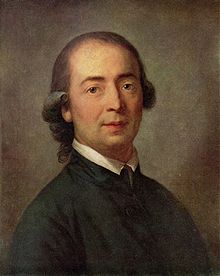This article needs additional citations for verification. (January 2024) |
Johann Gottfried Herder | |
|---|---|
 Herder, 1785 | |
| Born | 25 August 1744 Mohrungen, Kingdom of Prussia |
| Died | 18 December 1803 (aged 59) Weimar, Saxe-Weimar, Holy Roman Empire |
| Alma mater | University of Königsberg |
| Era | 18th-century philosophy |
| Region | Western philosophy |
| School |
|
| Academic advisors | Immanuel Kant |
Johann Gottfried von Herder (/ˈhɜːrdər/ HUR-dər; German: [ˈjoːhan ˈɡɔtfʁiːt ˈhɛʁdɐ];[15][16][17] 25 August 1744 – 18 December 1803) was a German philosopher, theologian, pastor, poet, and literary critic. He is associated with the Enlightenment, Sturm und Drang, and Weimar Classicism. He was a Romantic philosopher and poet who argued that true German culture was to be discovered among the common people (das Volk). He also stated that it was through folk songs, folk poetry, and folk dances that the true spirit of the nation (der Volksgeist) was popularized. He is credited with establishing or advancing a number of important disciplines: hermeneutics, linguistics, anthropology, and "a secular philosophy of history."[18]
- ^ Isaiah Berlin, Three Critics of the Enlightenment: Vico, Hamann, Herder, London and Princeton, 2000.
- ^ Kerrigan, William Thomas (1997), "Young America": Romantic Nationalism in Literature and Politics, 1843–1861, University of Michigan, 1997, p. 150.
- ^ Royal J. Schmidt, "Cultural Nationalism in Herder," Journal of the History of Ideas 17(3) (June 1956), pp. 407–417.
- ^ Gregory Claeys (ed.), Encyclopedia of Modern Political Thought, Routledge, 2004, "Herder, Johann Gottfried": "Herder is an anticolonialist cosmopolitan precisely because he is a nationalist".
- ^ Forster 2010, p. 43.
- ^ Frederick C. Beiser, The German Historicist Tradition, Oxford University Press, 2011, p. 98.
- ^ Christopher John Murray (ed.), Encyclopedia of the Romantic Era, 1760–1850, Routledge, 2013, p. 491: "Herder expressed a view fundamental to Romantic hermeneutics..."; Forster 2010, p. 9.
- ^ Forster 2010, p. 42.
- ^ This thesis is prominent in This Too a Philosophy of History for the Formation of Humanity (1774) and Ideas on the Philosophy of the History of Mankind (1784–91).
- ^ Forster 2010, p. 36.
- ^ Forster 2010, p. 41.
- ^ Barnard, F. M. (2005). In Herder on nationality, humanity and history (pp. 38–39). essay, McGill-Queen's University Press.
- ^ Forster 2010, p. 25.
- ^ Forster 2010, pp. 16 and 50 n. 6: "This thesis is already prominent in On Diligence in Several Learned Languages (1764)".
- ^ "Duden | Johann | Rechtschreibung, Bedeutung, Definition". Duden (in German). Retrieved 20 October 2018.
Johann
- ^ "Duden | Gottfried | Rechtschreibung, Bedeutung, Definition". Duden (in German). Retrieved 20 October 2018.
Gọttfried
- ^ "Duden | Herder | Rechtschreibung, Bedeutung, Definition". Duden (in German). Retrieved 20 October 2018.
Hẹrder
- ^ Jacob, Margaret C. The Secular Enlightenment. Princeton: Princeton University Press 2019, 192